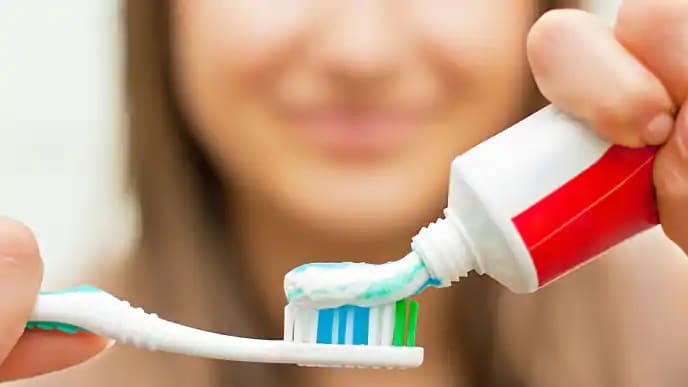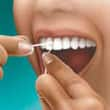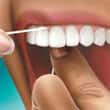-
-

FLUORIDE
What Is Stannous Fluoride Toothpaste?Discover what is Stannous Fluoride Toothpaste and its importance to prevent cavities and other oral health problems.

TEETH WHITENING
Whitening toothpaste - hydrogen peroxide vs. carbamide peroxideIf you lose one or more of your front teeth due to injury or decay, you may feel ...
-
Science & InnovationOral Health Commitment
- Oral Health Commitment
- Bright Smiles, Bright Futures
- Educational Resources
- Mobile Dental Van
- Volunteer
- ORAL HEALTH CHECK
- PRODUCT MATCH
- Oral Health and Dental Care | Colgate®
- Oral Health
- What Is the Right Way to Floss?


Proper Flossing Technique
You've heard that flossing is good for your dental hygiene, but might be wondering why — or how to do it correctly. Well, proper flossing removes plaque and food particles in places where a toothbrush can't easily reach — under the gumline and between your teeth. Because plaque build-up can lead to tooth decay and gum disease, daily flossing is highly recommended.
To receive maximum benefits from flossing, use the following proper technique:
- Starting with about 18 inches of floss, wind most of the floss around each middle finger, leaving an inch or two of floss to work with.
- Holding the floss tautly between your thumbs and index fingers, slide it gently up-and-down between your teeth.
- Gently curve the floss around the base of each tooth, making sure you go beneath the gumline. Never snap or force the floss, as this may cut or bruise delicate gum tissue.
- Use clean sections of floss as you move from tooth to tooth.
- To remove the floss, use the same back-and-forth motion to bring the floss up and away from the teeth.
What type of floss should I use?
There are two types of floss from which to choose:
- Nylon (or multifilament) floss
- PTFE (monofilament) floss
Nylon floss is available waxed and unwaxed, and in a variety of flavors. Because this type of floss is composed of many strands of nylon, it may sometimes tear or shred, especially between teeth with tight contact points. While more expensive, single filament (PTFE) floss slides easily between teeth, even those with tight spaces between teeth, and is virtually shred-resistant. When used properly, both types of floss are excellent at removing plaque and debris.
If it's hard to use regular floss, you can try floss picks, water flossing or a variety of alternative flossing tools. No matter how you do it, cleaning between your teeth will help keep your smile sparkling.
|
|
|
Use about 18" of floss, leaving an inch or two to work with. | Gently follow the curves of your teeth. | Be sure to clean beneath the gumline, but avoid snapping the floss on the gums |
This article is intended to promote understanding of and knowledge about general oral health topics. It is not intended to be a substitute for professional advice, diagnosis or treatment. Always seek the advice of your dentist or other qualified healthcare provider with any questions you may have regarding a medical condition or treatment.
Related Articles

Brushing and flossing
Waxed or Unwaxed Dental Floss? Assessing Your Oral Health NeedsWaxed and unwaxed dental floss are two of the most common types, and they both have their merits. Here's how they differ and how to know which to use.

Brushing and flossing
From Battle to Bonding: Making Brushing Fun for Your KidsBy: Mandy Dennis
Registered Dental Hygienist

Brushing and flossing
Replace Your Toothbrush Head Already!Find out when you need to replace your toothbrush head and the importance of a fresh brush head to your oral health.

Brushing and flossing
What Are Microbeads In Toothpaste?Learn more about microbeads in toothpaste and how the recent ban is good news for your health and the environment. Also learn about alternatives.
Related Products

Colgate Total Active Prevention Whitening Toothbrush is a soft toothbrush with charcoal infused spiral and Floss-Tip bristles (1). This soft bristle toothbrush fights the root cause* of cavities, plaque, gingivitis, bad breath, tartar buildup**, and stains*** and also helps remove surface stains to prevent stain buildup.

Power away plaque with Colgate Total Battery Powered Toothbrush. This battery operated toothbrush for adults fights the root cause* of cavities, plaque, gingivitis, bad breath, tartar buildup**, and stains***. Plus, this battery toothbrush has a built in 2 minute timer and features two cleaning modes, Sensitive and Regular, to cater to your unique oral care needs.

The Colgate Total® Active Prevention Foaming Clean Soft Bristle Toothbrush is specially designed to tackle the root cause* of cavities, plaque, gingivitis, bad breath, tartar buildup**, and stains***.

Colgate Total Alcohol Free* Gum Health Mouthwash delivers 24-hour protection** against bacteria and also helps prevent gum problems

Helping dental professionals
More professionals across the world trust Colgate. Find resources, products, and information to give your patients a healthier future







